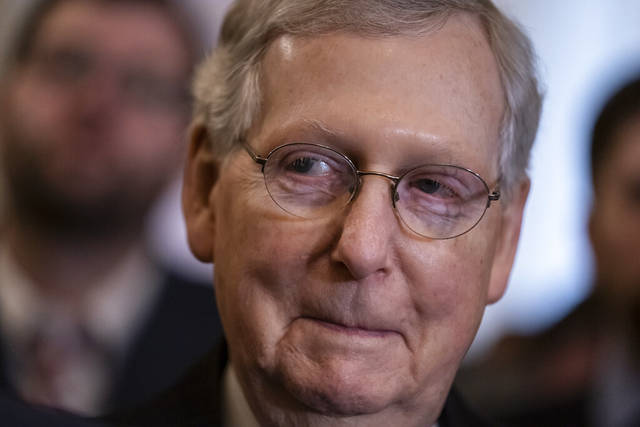https://naviga.triblive.com/news/politics-election/mcconnell-moves-to-change-senate-rules-to-speed-up-confirmation-of-trump-nominees/
McConnell moves to change Senate rules to speed up confirmation of Trump nominees

WASHINGTON — Senate Majority Leader Mitch McConnell, R-Ky., is setting up a major fight in the Senate next week over the chamber’s rules, as Republicans plan to deploy a controversial procedural maneuver to speed up consideration of hundreds of lower-level Trump administration nominees.
Agitated by Democrats slowing down consideration of President Trump’s picks, Senate Republicans had drafted a rules change that would significantly cut the time allotted for floor debate on numerous non-Cabinet agency officials and dozens of district court judges who have stalled on Capitol Hill.
As it now stands, a nomination can be debated for a maximum of 30 hours on the Senate floor after senators invoke cloture — a vote that cuts off unlimited debate on a nomination. Under the change proposed by Republicans, those 30 hours would be slashed to two hours for all nominations except for Cabinet choices, nominees for the Supreme Court and appellate courts, and some independent boards.
“This is a change the institution needs,” McConnell said Thursday. “This is a reform that every member should embrace: a functional process for building their administrations. Let’s give the American people a government they actually elected.”
Nuclear Option Alert — McConnell says plans to change Senate rules to cut debate time on district court nominees from 30 hours to 2 hours.This would clear the way for Republicans to speedily confirm a boatload of Trump judges.
"This is a change the institution needs."
— Sahil Kapur (@sahilkapur) March 28, 2019
McConnell railed against the Democrats, criticizing their “obstruction simply for the sake of obstruction.”
For nearly all of 2016, McConnell blocked the consideration of President Obama’s Supreme Court nominee Merrick Garland, insisting that the next president should fill the vacancy.
The so-called “nuclear option” has long been considered a controversial move in a chamber that is supposed to have a more bipartisan veneer. But Senate Democrats used the maneuver in 2013 to essentially kill the filibuster for all executive branch and judicial nominees except for candidates to the Supreme Court.
McConnell and Senate Republicans did the same — but for Supreme Court nominees — in 2017 as the Senate took up the nomination of now-Justice Neil Gorsuch to the Supreme Court.
This would not change the rules for circuit court or SCOTUS nominees. Sen. Lankford has been pushing this proposal for a long time, and the resolution McConnell is putting forward is the version that Lankford and Blunt intro'd earlier this year: https://t.co/h2JQkVSP11— Zoe Tillman (@ZoeTillman) March 28, 2019
Senate Minority Leader Chuck Schumer, D-N.Y., said McConnell’s move “has always been to manipulate Senate rules when it helps him and then change Senate rules when the tables turn; this is just another step in his effort to limit the rights of the minority and cede authority to the administration.”
In many cases, however, the White House simply hasn’t picked nominees. Of 714 positions that are considered key, the administration has not nominated people for 141 of them, according to a tracker kept by the Partnership for Public Service and The Washington Post.
Five years ago under Obama, the Democratic-led Senate adopted these pending changes with overwhelming support, but only temporarily. Frustrated Senate Republicans want to adopt these changes permanently, but have encountered resistance from Democrats who want the new rules to go into effect in January 2021.
Though changing the Senate’s rules often need bipartisan support, Senate Republicans are planning to invoke the nuclear option to alter them unilaterally and have planned to do so since at least their January party retreat at Nationals Park.
McConnell told Senate Republicans in a private party lunch earlier this month that he had locked down 51 GOP votes to change rules without any Democratic input, according to an official briefed on the meeting who spoke on the condition of anonymity to freely discuss the conversations.
Copyright ©2026— Trib Total Media, LLC (TribLIVE.com)
